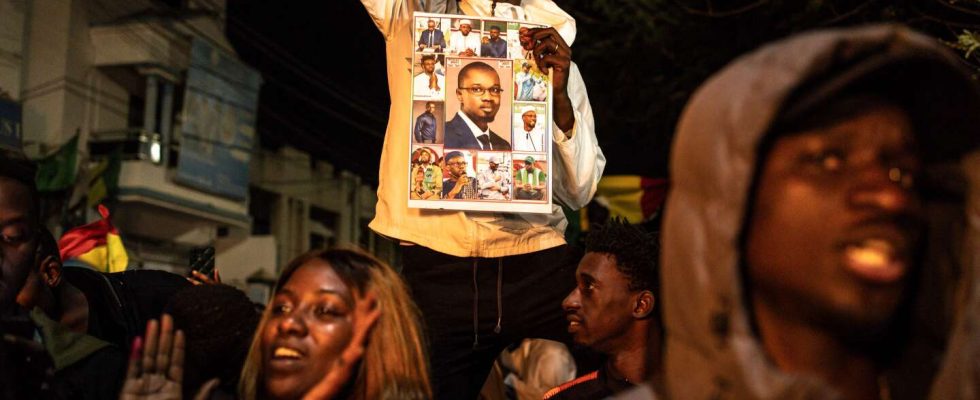In Senegal, opposition candidate Bassirou Diomaye Faye appeared to be getting closer, on Sunday March 24, to a presidential victory in the first round, which would amount to a political earthquake. According to the first trends, announced by the Senegalese radio Futurs Medias, he would have obtained 57% of the votes, against 31% for his main competitor, Amadou Ba. However, official results should not be known until later this week.
Five other candidates congratulated Mr. Faye in view of the trend in the counting of votes still underway, at the end of an election which was to decide between continuity and a perhaps radical change after three years of agitation and political crisis.
Anta Babacar Ngom, the only candidate among seventeen competitors, spoke on of “indisputable victory”. Déthié Fall congratulated Mr Faye on social media “for his great victory clearly acquired in view of the very strong trends which have emerged since the start of the proclamation of the results”. Three other competitors, Papa Djibril Fall, Mamadou Lamine Diallo and El Hadji Mamadou Diao, did the same.
The results published office by office in the media and on social networks give a clear advantage to Bassirou Diomaye Faye ahead of that of power, Amadou Ba, very far ahead of the fifteen other competitors.
The restoration of national “sovereignty”
Hundreds of Mr. Faye’s supporters sang and danced on Sunday evening at his campaign headquarters in Dakar. Processions of young people on motorbikes traveled through the streets of the capital, horns blaring, chanting ” at the Palace “ presidential.
The atmosphere was more somber among the few dozen Amadou Ba sympathizers at his headquarters. In a statement, Mr. Ba’s national campaign directorate said that“At this time, after counting around a third of the polling stations, the first trends show that the Republican and Democratic camp have defied the predictions about their predicted collapse as inevitable. A shift in Senegal into the populist adventure is not inevitable”. “In view of the results reported by our expert teams, we are certain of being, in the worst case scenario, in a second round couple”adds the text.
A victory for Mr. Faye, 43, still in prison ten days ago, “system change candidate” and a “left pan-Africanism”, and close to opponent Ousmane Sonko, could announce a systemic challenge. His program emphasizes the restoration of “sovereignty” national, sold off according to him abroad. He promised to fight corruption and better distribute wealth. He also promised to renegotiate mining, gas and oil contracts concluded with foreign companies. Senegal could start producing gas and oil in 2024.
He embodies “the choice for the breakup”, Mr. Faye said of himself while voting alongside his two wives in his village of Ndiaganiao. Benefiting from an amnesty law, he came out of eleven months of imprisonment ten days before the election, at the same time as his guide and leader of their dissolved party Ousmane Sonko.
Follow us on WhatsApp
Stay informed
Receive the essential African news on WhatsApp with the “Monde Afrique” channel
Join
Mr. Ba, 62, would extend the action of the outgoing Macky Sall, of whom he was Prime Minister just a few weeks ago and who appointed him to succeed him. Mr. Ba thus had to assume the legacy of President Sall, with persistent poverty, high unemployment, and hundreds of arrests in recent times. This is the first time that an outgoing president did not run for re-election.
Faye and Ba declared themselves “confident” in a victory in the first round. An absolute majority of votes cast is required to win in the first round. No date has been set for a second round.
A “calm” vote
Voters queued in dozens or hundreds during the day in front of different offices, without any exact assessment of participation (which was 66% in 2019) being provided. No notable incidents were reported and several voters expressed their satisfaction at voting, after the unrest caused by the postponement of the election. Some 7.3 million voters were asked to choose between seventeen competitors.
The election is being followed closely, with Senegal considered one of the most stable countries in West Africa shaken by putsch. Dakar maintains strong relations with the West, while Russia strengthens its surrounding positions.
The Senegalese were initially scheduled to vote on February 25 – the ballot boxes and Sunday ballots still bore this date. The postponement of the vote sparked violence which left four people dead. Several weeks of confusion tested Senegal’s democratic practice, until the date of March 24 was decided. The campaign was reduced to two weeks, falling in the middle of the Muslim fasting month.
Despite these delays, European Union observers noted that the operations had taken place “in calm, efficiency and [de manière] very orderly”said the head of the mission, Malin Björk.
Since 2021, the country has experienced episodes of unrest caused by the standoff between Ousmane Sonko and those in power, combined with social tensions and the vagueness long maintained by President Sall over his candidacy for a third term. The crisis continued with the postponement of the presidential election. Dozens of people were killed and hundreds arrested, damaging the country’s image, unfairly according to the government.

